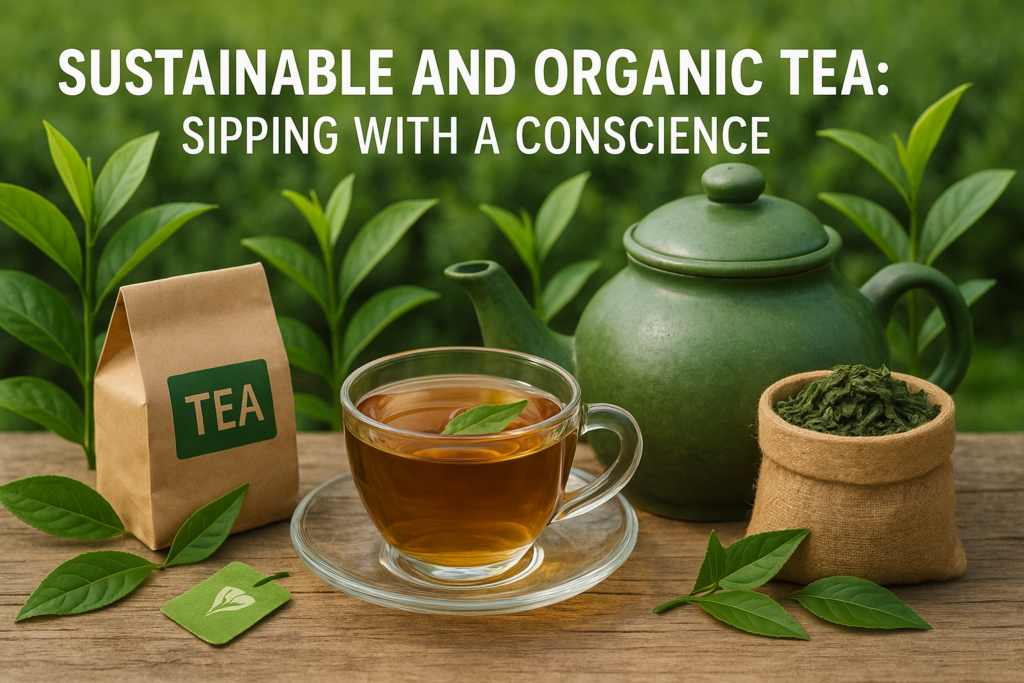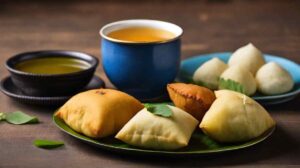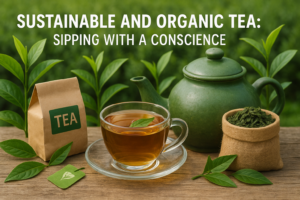🚚 Free shipping on orders above ₹1000

What Is Blue Tea? How Does It Help with Weight Loss?
Blue tea is becoming a hit in the health drink world. It’s a bright, caffeine-free drink made from butterfly pea
🚚 Free shipping on orders above ₹1000
🚚 Free shipping on orders above ₹1000

As consumers become more environmentally conscious, the demand for organic tea has seen a significant rise. Choosing to buy assam organic tea or other varieties of sustainable tea not only benefits the consumer but also supports eco-friendly farming practices and fair trade policies.
The production of tea, especially when done sustainably, has a lesser environmental impact. Sustainable tea production involves methods that conserve biodiversity, reduce pollution, and efficiently use water. By opting for organic tea, consumers promote a healthier ecosystem and better working conditions for tea farmers.
As consumers become more environmentally conscious, the tea industry is shifting towards more sustainable practices. This change is driven by the growing awareness of the environmental and social impacts of traditional tea farming methods.
Traditional tea farming is associated with several environmental challenges, including deforestation, water pollution, and soil degradation. The use of chemical pesticides and fertilizers in conventional tea farming not only harms the environment but also affects the health of tea workers. Eco-friendly tea production methods are essential to mitigate these issues.
In response to these environmental challenges, many tea producers are adopting ethical tea practices, including organic farming methods and fair labor practices. Companies like those found in an assam tea store are promoting sustainable tea production by sourcing tea from environmentally and socially responsible producers. This shift towards sustainability is not only beneficial for the environment but also enhances the quality of the tea and supports the well-being of tea workers.
By choosing tea from producers who adopt sustainable tea production methods, consumers can contribute to a more environmentally friendly tea industry. As the demand for sustainable and organic tea continues to grow, it is likely that more tea producers will adopt ethical practices, leading to a positive impact on the environment and the communities involved in tea production.
Organic tea has gained popularity, but what makes it truly organic is a question that requires a closer look at certification standards and processing methods. The journey to becoming certified organic is rigorous and involves adherence to strict guidelines that ensure the tea is produced without harming the environment.
To be labeled as organic, tea farms and producers must comply with organic certification standards that vary by country but generally include avoiding the use of synthetic fertilizers, pesticides, and genetically modified organisms (GMOs). For assam organic tea, this means that farmers must adopt sustainable farming practices that maintain soil health and biodiversity.
The certification process involves regular inspections and maintaining detailed records of farming practices, ensuring transparency and accountability.
Beyond obtaining certification, the processing of organic tea is crucial in maintaining its organic integrity. This involves careful handling from harvesting to packaging to prevent contamination with non-organic materials.
Tea processing includes withering, rolling, oxidation, and firing, all of which must be done using equipment and methods that do not compromise the organic status of the tea.
By understanding these processes, consumers can appreciate the value behind their tea and the efforts taken to ensure it is truly organic.
Sipping tea can be a guilt-free pleasure when you choose sustainable and organic options. As consumers, our choices have the power to shape the tea industry’s environmental and social footprint.
Choosing sustainable tea has numerous environmental benefits, including reduced deforestation, lower carbon emissions, and more efficient water use. Sustainable tea farming practices promote biodiversity and help maintain ecosystem services.
| Environmental Impact | Traditional Tea Farming | Sustainable Tea Farming |
| Deforestation | High risk due to land conversion | Low risk due to shade-grown practices |
| Water Usage | Inefficient irrigation systems | Efficient irrigation and rainwater harvesting |
| Biodiversity | Low due to monoculture practices | High due to diverse shade-grown crops |
Supporting ethical labor practices in tea production ensures fair wages, safe working conditions, and better living standards for tea workers. By choosing tea that is certified under ethical labor standards, consumers can significantly improve the lives of tea workers and their communities.
When you buy Assam tea or any other tea that is sustainably sourced, you’re not just enjoying a great cup, you’re supporting a more equitable and sustainable tea industry.
Assam tea, grown in the lush valleys of India’s northeastern region, is a prime example of sustainable tea production. This tea variety has gained worldwide recognition for its strong, malty flavor and rich aroma. The unique terroir of Assam, with its fertile soil and ample rainfall, contributes to the tea’s distinct characteristics.
Assam tea is known for its robust flavor profile, which is often described as malty and full-bodied. The tea’s distinct taste is a result of the region’s unique soil and climatic conditions.
The flavor profile of Assam tea is enhanced when brewed correctly. For a perfect cup, steep the leaves for 3-5 minutes in boiling water. This brings out the tea’s rich, malty flavor and deep amber color.
Choosing organic Assam tea not only ensures a high-quality brew but also supports sustainable farming practices. Organic Assam tea is rich in antioxidants, which can help boost overall health and well-being.
The Assam tea region has adopted various sustainable farming practices to minimize its environmental footprint. These practices include organic farming, rainwater harvesting, and biodiversity conservation. By choosing organic Assam tea, consumers support these eco-friendly initiatives.
The shift towards sustainability in Assam’s tea industry is not only beneficial for the environment but also enhances the livelihoods of local farmers and communities. As the demand for organic and sustainably produced tea continues to grow, Assam is well-positioned to meet this demand while maintaining its commitment to environmental stewardship.
The world of organic Assam tea is vast and varied, but knowing what to look for can simplify your buying experience. With numerous options available, both online and offline, making an informed decision is crucial.
When purchasing organic Assam tea, several factors come into play. First, consider the quality indicators and tea grades. Understanding these elements can significantly enhance your tea-buying experience.
Tea grades are determined by the size and quality of the tea leaves. Orthodox and CTC (Crush, Tear, Curl) are two main types, with Orthodox being further divided into sub-grades like FTGFOP (Finest Tippy Golden Flowery Orange Pekoe).
Look for certifications like USDA Organic or ECOCERT on the packaging, which ensure that the tea is grown and processed according to organic standards. Also, check for information on the tea’s origin, production methods, and batch numbers.
You can buy Assam tea from various sources, including local tea stores, online tea retailers, and directly from tea estates. Online tea stores in India offer a wide selection, while international online options provide convenience and global access.
Some well-known online tea stores in India include Amar Tea and Chai Point. These platforms offer a range of Assam teas, detailed product descriptions, and customer reviews.
For those outside India, online stores like Amazon and specialty tea retailers offer a variety of Assam teas. Look for sellers with good ratings and reviews.
By considering these factors and exploring various purchasing options, you can enjoy high-quality organic Assam tea that meets your preferences and standards.
As we conclude our exploration of sustainable and organic tea, it’s clear that making informed choices can have a significant impact on the environment and ethical labor practices. Choosing assam organic tea or other organic tea varieties supports farming practices that prioritize soil health, biodiversity, and fair labor conditions.
Embarking on a sustainable tea journey means being mindful of the tea’s origin, production process, and the people involved. By opting for organic tea, you’re not only savoring high-quality flavors but also contributing to a more equitable and environmentally friendly tea industry.
As you continue to explore the world of tea, consider the positive impact of your choices. Whether you’re a seasoned tea enthusiast or just beginning to discover the joys of tea, every cup has the potential to make a difference. So, take a moment to appreciate the rich flavors and stories behind your tea, and enjoy the journey toward a more sustainable future.
Assam Organic Tea is a type of tea grown in the Assam region of India, cultivated using organic farming practices that avoid the use of synthetic fertilizers, pesticides, or genetically modified organisms (GMOs). You can buy Assam Organic Tea from reputable online tea stores or visit an Assam tea store.
To ensure your Assam Tea is organic, look for certifications like USDA Organic or India Organic, which guarantee that the tea is produced according to organic standards. You can also check the packaging for information on the farming practices used.
You can buy Assam Tea online from various online tea stores in India or international online retailers that specialize in tea. Look for reputable sellers that provide clear information about the tea’s origin, quality, and certifications.
Buying organic Assam Tea supports sustainable farming practices, reduces environmental impact, and promotes fair labor practices. Organic tea is also free from chemical residues, making it a healthier choice for consumers.
To maintain the quality of Assam Tea, store it in an airtight container, away from direct sunlight, moisture, and strong odors. This will help preserve the tea’s flavor and aroma.
Yes, some tea estates in Assam offer direct sales to consumers, either online or through on-site purchases. Buying directly from the estate can ensure authenticity and quality.
To brew Assam Tea, use boiling water and adjust the steeping time according to your preference. Traditionally, Assam Tea is brewed strong, with milk and sugar added to taste.

Blue tea is becoming a hit in the health drink world. It’s a bright, caffeine-free drink made from butterfly pea

In India’s dynamic cities like Bangalore and Mumbai, fostering strong business connections is crucial for success. Corporate gifting plays a

Uncover the rich tradition of Assam tea, where it’s more than a drink, it’s a way of life. Renowned for

Tea Pairings for Bangalore’s Favorite Street Food Bangalore, the heart of India’s tech industry, is also a haven for delicious

The debate between tea and coffee lovers is ongoing. It’s time to examine the health benefits of these popular drinks.

A Comprehensive Exploration of Tea Varieties and Unique Flavors with IC Tea Are you a tea aficionado seeking to elevate

As consumers become more environmentally conscious, the demand for organic tea has seen a significant rise. Choosing to buy assam

As the summer season approaches, many are seeking refreshing beverages to quench their thirst. Iced teas have emerged as a
